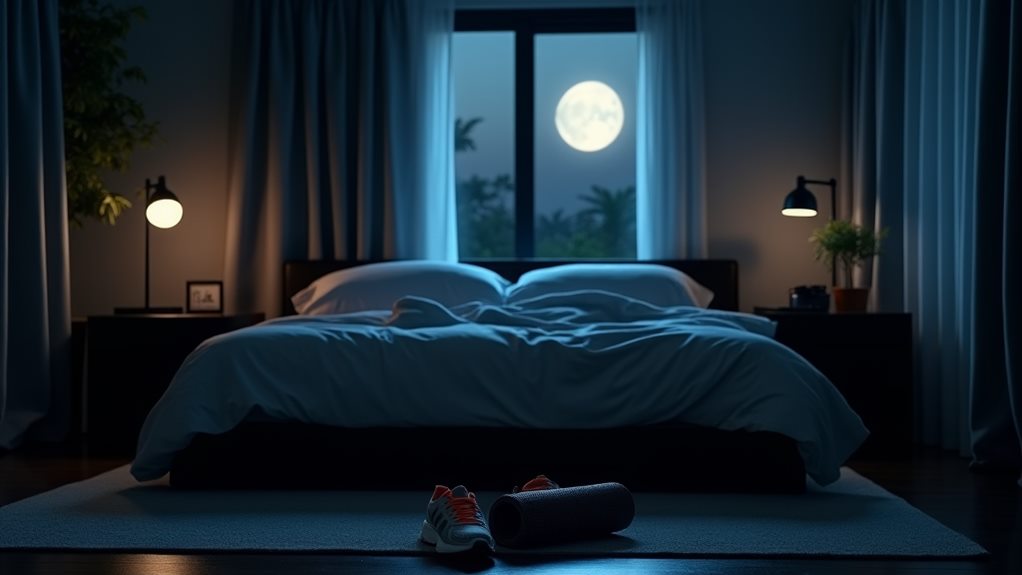
Exercise plays a crucial role in enhancing your sleep by helping you fall asleep faster and improving the quality of your rest. Just 30 minutes of moderate aerobic activity can lead to deeper sleep and fewer nighttime disturbances. Exercise boosts melatonin production and reduces stress, putting you in a more relaxed state for a restorative sleep. It’s a natural remedy for insomnia, promoting longer sleep durations while decreasing the need for sleep medications. Timing matters, so aim for workouts a couple of hours before bedtime. Keep moving and discover additional ways this can transform your nightly rest.
Benefits of Exercise on Sleep
Exercise is a powerful tool for enhancing your sleep quality. Engaging in regular physical activity not only improves your sleep by reducing the time it takes to fall asleep, known as sleep onset, but also strengthens the immune system, promoting better overall health. Just 30 minutes of moderate aerobic exercise can work wonders, allowing you to enjoy deeper sleep and fewer nighttime awakenings, similar to the effects of prescription sleep aids.
Imagine the boost in overall energy levels you’ll experience with improved rest. Exercise stimulates melatonin production, the hormone that regulates your sleep cycles, making it easier to maintain a consistent sleep-wake rhythm. This natural adjustment can effectively tackle insomnia symptoms, leaving you more refreshed and alert during the day.
Daytime sleepiness will no longer drag you down, thanks to exercise’s knack for reducing stress and anxiety. The endorphins released during physical activity create a relaxed state conducive to better sleep. With these benefits, exercise elevates not only your sleep quality but also your cognitive function and daily productivity. So, why not make exercise a cornerstone of your routine and enjoy the rejuvenating sleep you deserve?
Timing Matters for Sleep Quality
While exercise undeniably boosts sleep quality, the timing of your workouts plays a significant role in unlocking the full benefits of rest. You need to be mindful of how exercise affects sleep hygiene. Engaging in physical activity at the right time can be your best ally for a restful night. For instance, moderate exercise not only aids sleep but also helps balance cortisol levels post-stress, enhancing your recovery speed and overall well-being. Timing your exercise 1-2 hours before bedtime generally allows your heart rate and core body temperature to normalize, fostering deeper sleep.
However, evening exercise isn’t entirely off-limits. For some, aerobic workouts later in the evening can still improve the quality of sleep by promoting quicker sleep onset and more profound slumber. But beware: exercising within three hours of your bedtime might lead to poor sleep by keeping your heart racing and your body warm.
Exercise and Insomnia Reduction

When battling insomnia, integrating regular exercise into your routine can be a game-changer. Imagine a natural remedy that doesn’t involve medication but brings relief through movement. Regular aerobic exercise can significantly reduce insomnia symptoms and rival prescription sleep aids in improving sleep quality. Here’s how exercise works its magic:
- Increased Melatonin Production: Physical activity boosts melatonin levels, the hormone responsible for regulating sleep-wake cycles. This leads to quicker sleep onset and deeper, more restful sleep. Physical activity, such as walking, improves cardiovascular fitness and can also reduce symptoms of depression, contributing to better sleep.
- Enhanced Total Sleep Time: Engaging in moderate-intensity activity for at least 150 minutes a week decreases sleep onset latency and increases total sleep time. Essentially, you fall asleep faster and enjoy more restorative snooze time.
- Structured Exercise Programs: Participating in planned exercise routines means fewer nighttime awakenings and improved sleep quality for those struggling with insomnia.
Moreover, consistent physical activity not only alleviates insomnia symptoms but also enhances daytime functioning. You’ll find yourself relying less on sleep medications and more on your body’s natural rhythm. So, if you want better sleep and a more energized day, lace up those sneakers and let regular exercise work its sleep-enhancing wonders!
Optimal Exercise Practices
You’ve explored how exercise can transform your nights, leaving behind restless tosses and turns. But how do you ensure you’re doing it right? Start with at least 30 minutes of moderate aerobic exercise like brisk walking or cycling. It’s a proven way to improve your sleep quality and reduce sleep onset time on the same night. For even better results, try scheduling your physical activity 1-2 hours before bedtime, allowing those feel-good endorphins and your elevated body temperature to settle down.
Consistency is key here. Aim for at least five days a week to see sustained improvements. Research suggests about 150 minutes of moderate-intensity exercise weekly enhances your sleep quality and supports optimal health. But take care with your timing. Morning workouts or early afternoon sessions are preferable, boosting your evening’s rest without the risk of late-night high-intensity exercises disrupting your sleep efficiency.
Lastly, don’t underestimate evening relaxation. Activities like yoga or gentle stretching promote relaxation and won’t mess with your sleep if done a few hours before bedtime. Embrace these optimal exercise practices, and watch your nights—and mornings—dramatically improve.
Impact of Consistent Physical Activity

Imagine waking up refreshed and ready to take on the day, thanks to the power of consistent physical activity. By committing to 30 minutes of moderate exercise five days a week, you can significantly boost your sleep quality and duration. Regular exercise plays a key role in realigning your circadian rhythms and stabilizing your sleep-wake cycle, ensuring a smoother transition into restful sleep at night. Here’s how it impacts your sleep in practical terms:
- Fall Asleep Faster: Regular physical activity reduces sleep onset latency, allowing you to fall asleep faster and enjoy longer periods of sleep.
- Enhance Sleep Quality: With consistency, your exercise routine turns into a reliable way to lower daytime sleepiness, making you feel more alert and productive during the day.
- Improve Overall Health: Engaging in physical activity regularly fosters a cycle of better sleep and enhanced well-being, contributing to improved long-term health.
Exercise Boosts Restorative Sleep
Embracing a lifestyle that includes regular moderate aerobic exercise not only enhances physical health but also has profound benefits for sleep quality. By increasing slow wave sleep, exercise allows for effective brain and body rejuvenation, ultimately contributing to restorative sleep. Engaging in just 30 minutes of moderate exercise daily can result in immediate improvements, such as falling asleep faster, reducing sleep disruptions, and increasing overall sleep efficiency. This practice not only boosts total sleep time but also ensures a more restful slumber.
Furthermore, exercise’s ability to release endorphins plays a crucial role in stabilizing mood and alleviating stress, promoting a mindset conducive to better sleep. As research has highlighted, aerobic exercise serves as a valuable non-pharmacological approach to mitigating insomnia symptoms, thus providing a natural, effective remedy for those struggling with sleep disorders.
Considering these findings, incorporating exercise into one’s daily routine can be a pivotal strategy for achieving optimal sleep. With moderate aerobic activity, individuals can unlock the dual benefits of enhanced physical health and improved sleep quality, laying the foundation for a more energized and balanced life. Whether aiming to address specific sleep challenges or simply to enjoy more rejuvenating rest, exercise emerges as a transformative element, offering an accessible and holistic avenue for all.














